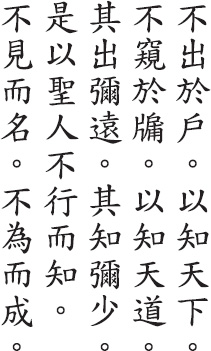47
 |
Without going out your door you can know the whole world without looking out your window you can know the Way of Heaven the farther people go the less they know sages therefore know without traveling name without seeing and succeed without trying |
CHUANG-TZU says, “Who takes Heaven as their ancestor, Virtue as their home, the Tao as their door, and who escapes change is a sage” (Chuangtzu: 33.1).
HO-SHANG KUNG says, “Those who are sages understand other individuals by understanding themselves. They understand other families by understanding their own family. Thus, they understand the whole world. Humankind and Heaven are linked to each other. If the ruler is content, the breath of Heaven will be calm. If the ruler is greedy, Heaven’s breath will be unstable. Sages do not have to ascend into the sky or descend into the depths to understand Heaven or Earth.”
WANG PI says, “Events have a beginning. Creatures have a leader. Roads diverge, but they lead back together. Thoughts multiply, but they all share one thing. The Way has one constant. Reason has one principle. Holding on to the ancient Way, we are able to master the present. Although we live today, we can understand the distant past. We can understand without going outside. If we don’t understand, going farther only leads us farther astray.”
SU CH’E says, “The reason the sages of the past understood everything without going anywhere was simply because they kept their natures whole. People let themselves be misled by things and allow their natures to be split into ears and eyes, body and mind. Their vision becomes limited to sights, and their hearing becomes limited to sounds.”
WANG P’ANG says, “If we wait to see before we become aware and wait to become aware before we know, we can see ten thousand different views and still be blind to the reason that binds them all together.”
LI HSI-CHAI says, “Those who look for Heaven and Earth outside look for forms. But Heaven and Earth cannot be fathomed through form, only through reason. Once we realize that reason is right here, it doesn’t matter if we close our door. For those who are wise, knowledge is not limited to form. Hence, they don’t have to go anywhere. Name is not limited to matter. Hence, they don’t have to look anywhere. Success is not limited to action. Hence, they don’t have to do anything.”
LAO-TZU says, “The name that becomes a name / is not the Immortal Name” (Taoteching: 1).
CH’ENG HSUAN-YING says, “‘Without traveling’ means to know without depending on previous or external experience. ‘Without seeing’ means to know that everything is empty and that there is nothing to see. ‘Without trying’ means to focus the spirit on the tranquillity that excels at making things happen.”
WU CH’ENG says, “‘To succeed without trying’ is the result of the previous two lines. Because those sages know everything without going anywhere and see everything without looking at anything, they succeed at everything without any effort at all.”
Some commentators wonder if line eight is not corrupt, if ming (name) is not a mistake for ming (understand), and if the line should not then read: “understand without seeing.” However, the only early edition that supports such an emendation is that of Han Fei. In a similar sequence, the Chungyung: 26.6 has: “flourish without displaying / change without moving / and succeed without trying.”